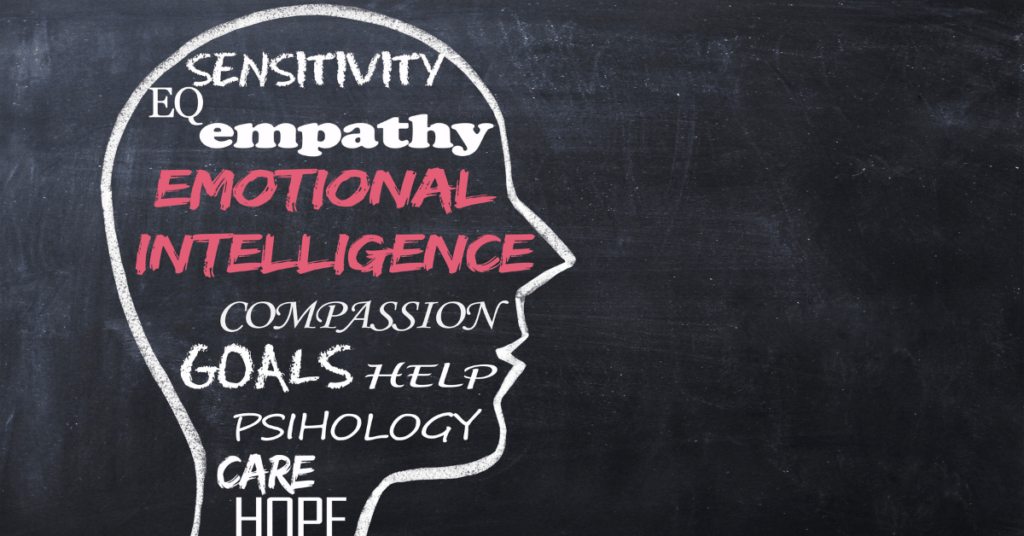Contents
What Is Emotional Intelligence?

Emotional intelligence is one’s ability to identify, assess, regulate, and control the emotions of oneself, others, and groups. Emotional intelligence includes four aspects: perceiving emotion accurately in oneself and in others, understanding the causes of one’s own emotions and those of others. Using this information to guide one’s thinking and actions to promote personal growth and good relationships with other people, and manage emotions so that they are appropriate. Below is the emotional intelligence test to understand yourself better.
This intelligence was first termed as the ability to be aware of and express your feelings. And that of others, in a way that helps you to manage difficult situations.
Emotional intelligence is closely related to concepts such as emotional literacy, emotional quotient (EQ), psychological awareness, and emotional style. The term “emotional intelligence” is believed to have been coined and first popularized by the author and psychologist Peter Salovey, and later further developed by other researchers such as John Mayer and differing from those, Daniel Goleman. Emotional intelligence is composed of four different, but equally important personal skills:
- Self-awareness
- Self-regulation
- Social awareness
- Relationship management
These skills are all crucial to understanding your emotions and those around you. So that you know when to push yourself or back off from a situation. It can also help you find the right words for difficult conversations. Understanding your emotions can help you understand what other people are going through as well.
Types Of Emotional Intelligence
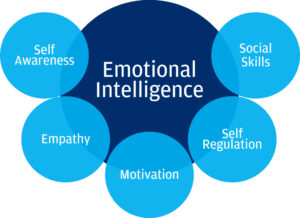 Emotional Intelligence can be divided into 4 main categories which are self-awareness, self-regulation, motivation, and empathy. Each one of these four characteristics is equally important because each one can affect your life in a positive way. Let’s take a closer look at the four main types of emotional intelligence:
Emotional Intelligence can be divided into 4 main categories which are self-awareness, self-regulation, motivation, and empathy. Each one of these four characteristics is equally important because each one can affect your life in a positive way. Let’s take a closer look at the four main types of emotional intelligence:
1. Self-awareness is the ability to recognize and understand your own emotions. When you are aware of your own emotions, it makes it easier for you to manage them and stay in control during challenging situations.
2. Self-regulation is the ability to manage your emotions. When you can regulate your emotions, it makes it easier for you to stay calm and in control during difficult situations. This also helps you avoid letting your emotions get the best of you.
3. Motivation is the desire to achieve a goal or reach a desired outcome. When you are motivated, it makes it easier for you to pursue your goals and stay focused on what’s important.
4. Empathy is the ability to understand and feel the emotions of others. When you are empathetic, it makes it easier for you to build strong, healthy relationships with the people around you. It also allows you to better understand other people’s points of view which can be helpful when trying to resolve conflicts.
Why You Should Care About Your EQ?

Your emotional intelligence (EQ) is one of the most important things you have in life. EQ affects your ability to achieve your goals, maintain healthy relationships, and navigate through life’s ups and downs.
There are many reasons why you should care about your EQ. Here are some of the most important ones:
- Your EI can help you achieve your goals. Your EI helps you understand and manage your emotions, which gives you the power to stay motivated and focused when pursuing your goals.
- Emotional intelligence can help you maintain healthy relationships. EI helps you understand and manage your own emotions as well as the emotions of others. This makes it easier for you to build strong, healthy relationships with the people you care about. It also increases your ability to communicate effectively with others which can help you in your career.
- Your EI can help you navigate through life’s ups and downs. When faced with challenges or adversity, having high EQ makes it easier for you to manage difficult emotions that come up when times get tough.
Emotional Intelligence Benefits
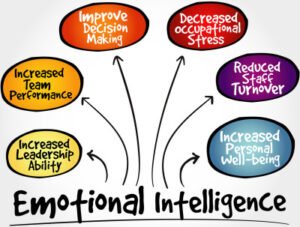 Emotional intelligence is a skill that can be acquired as it relates to understanding one’s own emotions as well as those of others. When everyone understands their feelings, they are better equipped to communicate with each other because no one feels misunderstood. An individual is also better able to control their impulses and anger. This can help them maintain a positive mood. By starting a conversation about emotions with the people around you. You will be surprised by how much easier it is to talk about sensitive topics. Because your feelings are not going to get hurt as easily. People who have emotional intelligence-
Emotional intelligence is a skill that can be acquired as it relates to understanding one’s own emotions as well as those of others. When everyone understands their feelings, they are better equipped to communicate with each other because no one feels misunderstood. An individual is also better able to control their impulses and anger. This can help them maintain a positive mood. By starting a conversation about emotions with the people around you. You will be surprised by how much easier it is to talk about sensitive topics. Because your feelings are not going to get hurt as easily. People who have emotional intelligence-
- Are able to identify certain emotions, as well as show empathy for others. When making a decision, they think of how it will affect other people and not just themselves.
- There are many reasons why it is beneficial to have high emotional intelligence. People with high emotional intelligence are often better able to cope with stress. And solve their own problems without depending on somebody else to do it for them.
- They’re also more likely to have a happy, fulfilling social life.
- High EI people know how to interact well in different social situations and aren’t easily offended or upset by other people.
Tips For Improving Emotional Intelligence
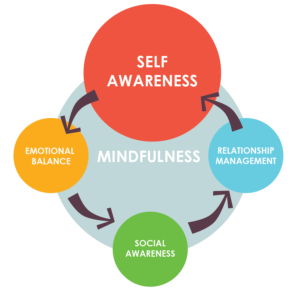 These are some tips that you should follow for increasing your emotional intelligence-
These are some tips that you should follow for increasing your emotional intelligence-
Learn new things– Being open to new experiences can help build your emotional intelligence.
Keep an open mind– Empathy is one of the most important elements of emotional intelligence. This means being able to perceive people’s feelings and understand what they are thinking. Being flexible and adaptable means that you will be more likely to look at situations from other people’s points of view.
Avoid conflict– Disagreements with others are inevitable, but emotional intelligence can help you to tackle these in a constructive way. Another skill that comes under this category is the ability to deal with difficult situations where emotions are running high.
Be aware of your emotions- The first step in developing higher emotional intelligence is to be aware of your own emotions. When you are aware of your emotions, it makes it easier for you to manage them and stay in control during challenging situations.
Manage your emotions- The next step is to learn how to manage your emotions. When you can regulate your emotions, it makes it easier for you to stay calm and in control during difficult situations. This also helps you avoid letting your emotions get the best of you.
Stay motivated- The third step is to stay motivated when pursuing your goals. When you are motivated, it makes it easier for you to pursue your goals and stay focused on what’s important.
Practice mindfulness- The fifth step is to practice mindfulness. Mindfulness is the act of being present in the moment and paying attention to your thoughts and emotions. When you are mindful, it makes it easier for you to manage your emotions and stay in control during challenging situations.
Improving Emotional Intelligence With Key Skills
The 4 key skills are self-awareness, self-management, social awareness, and relationship management.
Self-awareness
knowing your emotions and understanding what they mean – how they make you feel and why. Knowing what triggers these emotions and how to manage them so they don’t control you. For example, using certain strategies when feeling negative emotions. Such as avoiding the situation that’s causing you stress or taking time to relax and calm down–can help reduce these feelings.
Knowledge
know yourself – your strengths and where you need to improve. Build ’emotional literacy’ by reading about other people’s feelings, discussing feelings with friends, or taking responsibility for your feelings by writing in a journal or talking to a counselor.
Self-management
Take care of yourself by regulating your emotions, setting boundaries, and managing stress. This is one of the most important skills because it protects you from being overwhelmed and allows you to stay in control during difficult times.
Social Awareness
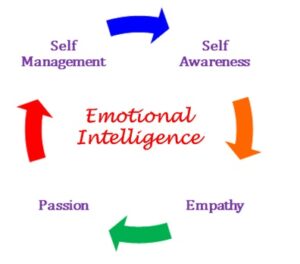
being aware of the emotions of others and what is going on around you. Reading people, picking up on social cues, understanding body language, and facial expressions. You should be empathetic while dealing with people. When you are able to understand and feel the emotions of others, it makes it easier for you to build strong, healthy relationships with the people around you. It also allows you to better understand other people’s points of view which can be helpful when trying to resolve conflicts.
Relationship Management
Handling relationships effectively by being assertive when needed, being supportive and constructive, and handling conflict positively. Also knowing when to walk away from a toxic relationship. Effective management of our emotions is the key to success in school, work. And also in home life – in relationships with friends, family, colleagues, or partners. People with high emotional intelligence have strong social ties with family, friends, and colleagues.
It’s no surprise that people who are emotionally intelligent tend to be more successful than those who do not have this skill.
If you are looking for affordable Online Counseling MantraCare can help: Book a trial therapy session
